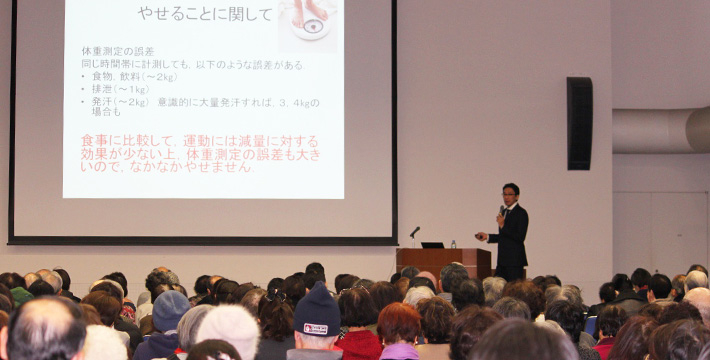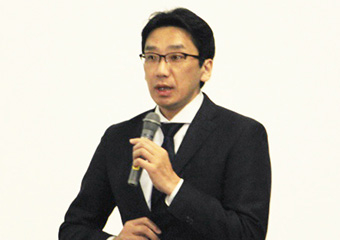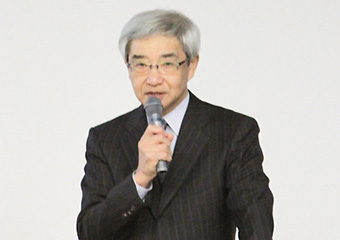In collaboration with Tokyu Hospital located just outside Ookayama Campus, Tokyo Tech's Institute for Liberal Arts held the third Ookayama Health Lectures for the public on February 7, 2017. A record 245 local residents joined to listen to Professor Naoyuki Hayashi's lecture on the benefits of exercise and Dr. Katsuhito Itoh's talk on mental health.

Session One: The effects of exercise
- Prof. Naoyuki Hayashi, Institute for Liberal Arts

Professor Naoyuki Hayashi kicked off the afternoon with a talk on physical health from a researcher's perspective.
The professor began with words of encouragement, explaining that jogging for just 35 minutes or walking briskly for one hour a week can significantly improve one's health. Even short, low-intensity exercise can help reduce the risk of cancer, metabolic syndrome, and mental health issues.
No shortcuts
Blood pressure and body fat are accessible indicators for monitoring health. Nearly half of Japanese people in their 40s are hypertensive, a factor that can lead to serious complications, but which can also be alleviated by walking or jogging. However, there are no shortcuts in treating high blood pressure or losing weight. Walking 10,000 steps a day burns 100-200 kcal, or 3,000-6,000 kcal a month. As one kilogram of body fat equals 7,000-9,000 kcal, people should not expect results on the scale immediately. Food is loaded with energy, so hide the sweets, watch the size of your meals, and increase physical activity after these meals, Hayashi advised.
Positive effects on mental health
Exercise is believed to improve overall performance, quality of sleep, and resistance to psychological conditions such as depression and neurosis. To demonstrate, Hayashi introduced Zero Hour, an exercise experiment conducted at Naperville Central High School in Illinois, USA in the late 90s, which prescribed 10 minutes of exercise to students before classes each morning. The results were indisputable. Zero Hour not only improved students' academic performance, but also cut the rate of obesity to 10 percent, 25 percent below the state average.
An informative blend of interesting figures, findings, and advice sprinkled with touches of humor, Hayashi's presentation concluded with a lively round of applause from the audience.
Session Two: Shoma Morita and psychological well-being
- Dr. Katsuhito Itoh, Director of Health Management Center, Tokyu Hospital

Session Two provided a view on mental health through the eyes of a medical doctor.
Tokyu Hospital's Dr. Katsuhito Itoh focused on the story and methods of Dr. Shoma Morita (1874-1938), a Tokyo-based psychiatrist and founder of Morita therapy for patients with anxiety-based disorders.
From adversity to helping others
As he was preparing to enter university, Morita's father failed to send his son money as promised. Morita suffered a nervous breakdown and developed a severe thiamine deficiency, in addition to a strong antipathy towards his father. Refusing to give up, Morita used his anger and illness as inspiration, studying furiously and passing his entrance examinations. These were the beginnings of Morita therapy, a process in which the acceptance of one's feelings is the first step towards recovery. Today, adaptations of the method are applied in both Eastern and Western therapy to help patients solve a variety of difficult life situations.
Our two greatest desires
Base on Morita's philosophy, human desires are divided into two conflicting categories: a desire to live fully and a desire to maintain security and comfort. The former includes achieving professional results, forming better human relationships, and living a healthy life. If these cannot be realized, they gradually become insecurities that people constantly want to take action against: I want to fix my downfalls, do something about my work situation, and mend my broken relationships.
Reactions to this insecurity can then be divided into two clear types: what can be done and what cannot be done. If we fail at work, we can think about the cause and try again even harder. If we have a sore throat, we can take medication or stop smoking. Our emotions of discomfort or anger, anxiety around others, or the feeling of needing to be like those around us, on the other hand, cannot be changed.
The key is realizing that trying to change the unchangeable will lead to a vicious cycle that will hamper us from fully functioning. To avoid this, we must accept life as it is, accept the existence of our negative feelings, and then put them on the shelf without attempting to manipulate them. By doing so, we can focus on our desire to live fully and express our true selves naturally, Itoh explained.
Dr. Itoh's detailed explanation of Morita's concepts and their relevance to daily life provided a good balance to the physical health aspects discussed by Hayashi.
. Any information published on this site will be valid in relation to Science Tokyo.






